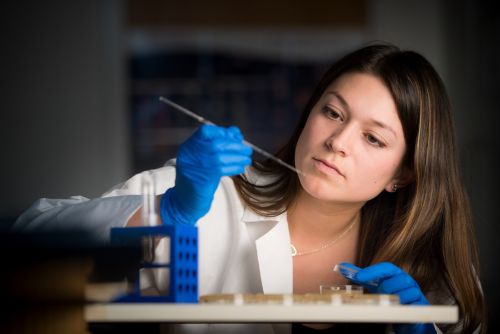Early riser: 7 ways to start your biomedical career well before graduate school
By Mackenzie Bloom
By Mackenzie Bloom

Mackenzie Bloom
PhD student, St. Jude Graduate School
If you are an undergraduate student planning to apply to graduate programs in a biomedical or health science research field, there is a lot you can do to help ensure your success in admission to a top graduate school—and the sooner you start, the farther you’ll go. Both of us are busy, so let’s start working through this list now!
Completing a multi-semester research project is the first thing you need to do. This is first on my list because it is the main thing most programs look for in incoming students. But if you’re already halfway through your junior year, don’t panic. You can rack up legitimate research experience in less time, but the earlier you start, the more competitive you will be after graduation.
Admittedly, I caught the bug early and started working in a chemical engineering lab for a few hours each week during my freshman year. I was able to put enough data together to make a presentation at the university level. And by the end of my sophomore year, I was presenting it at the national level, at conferences. It took four semesters of part-time work on the same project to get me there.
Find a paying research job or internship: As a paid research assistant or summer intern with a stipend, you can pay some of your bills and build on your research experience at the same time. By my senior year, I was a part-time student working nearly full-time hours in a lab. Many students find it difficult to make time for a substantial research project when they need a part time job to pay for rent, tuition, etc. Taking advantage of these opportunities allows you to work toward becoming a stronger applicant without neglecting everyday responsibilities.
Take advantage of your college’s service for placing undergrads on research projects: Like many universities, my undergraduate alma mater, the University of Kansas (KU), has a program for helping students find research opportunities on and off campus. The Center for Undergraduate Research helped me craft query emails, navigate faculty pages, and use PubMed and other resources to find papers and start getting exposed to what scientists had been doing on campus.
Find research opportunities the old-fashioned way: When one of my faculty mentors left the university, I found a new undergraduate lab opportunity on my own:
Graduate schools value undergraduate lab experience, but they don’t necessarily measure it by time spent. You want to have some type of product—research results—to show that you accomplished, discovered, or disproved something.
Hopefully, your independent project, or your contributions to a larger study, will earn you a co-author credit in a journal article. Not all students will get the opportunity to publish their findings as undergrads, but there are many other ways to show off your work. There is a small but growing number of scientific journals that publish papers by undergraduate authors. In fact, your own college may be publishing one.
The easiest way to show off your work is to PRESENT it. Take every opportunity to give presentations. If you haven’t been published or selected to make a presentation off campus, it may be beneficial to prepare yourself to give a polished presentation about what you did, along with a properly formatted research summary. Many programs will ask you to present at interviews and provide written descriptions of your research experience.

Even if you don't need money for your undergraduate project, it will eventually become important to show that you know how to successfully ask for it. This is a skill that is not expected of an undergrad and can really set you apart from the pack. I applied for undergraduate grants and awards through my university and various funding organizations at the state and national level. These awards are intended to fund summer research stipends and travel expenses. Regardless of whether I wanted to travel to another institution or just spend the summer back at my KU “home lab,” I applied for as many grants and awards as I could, to see how many would say “yes.” Now all five organizations that offered me help are listed on my CV, demonstrating my ability to obtain funding.
I spent some of my summers at other institutions via research exchange programs, like the Pediatric Oncology Education (POE) program, which like the National Symposium for Undergraduate Research, is hosted by St. Jude Children’s Research Hospital.
This gave me a broad toolkit of research techniques that I wouldn’t have learned had I only experienced one lab environment. And because I've seen different working environments through my internships, I already have an idea of what size of lab I want, what type of relationship I want to have with a primary investigator, and what type of lab dynamic is my best fit.
Before your first phone call or meeting with graduate school faculty, read their papers and understand the concepts of their research, along with some of the tools they used.
They will be impressed when you ask them a reasonably good question, even if it’s just a technical or procedural detail. This demonstrates that you are comfortable talking about the everyday work of laboratory or clinical investigation and that you understand the biological principles behind their work.
On the formal faculty interviews and the surprisingly crucial meet-ups with current graduate students, you must be able to speak comfortably and confidently about your own research interests.
Prepare a solid “elevator pitch” about your research experience. That’s an old sales term for making a pitch during a lucky, brief encounter with a potential customer or investor. You should have a two-minute, a five-minute and a ten-minute explanation of your research in your back pocket that answers three questions:
There are national and global academic societies that focus on every scientific topic. Becoming a student member of these organizations will provide you with resources and networking opportunities to meet scientists in your field from around the world. Through my involvement in the Biomedical Engineering Society and the Society for Biomaterials, I was able to attend and present at international conferences and meet some of the contacts that I still collaborate with today.
The common theme of all of these suggestions is the importance of learning current methods in biomedical investigation and the need for you to understand how laboratory projects cycle through conception, design, execution and documentation.
Mackenzie Bloom, PhD is a postdoctoral research associate in the lab of Dr. Kim Nichols at St. Jude Children's Research Hospital. She earned her PhD from the St. Jude Graduate School of Biomedical Sciences. She also holds a bachelor of science in biology from the University of Kansas, where she was an undergraduate research assistant in chemical engineering and molecular biology labs.